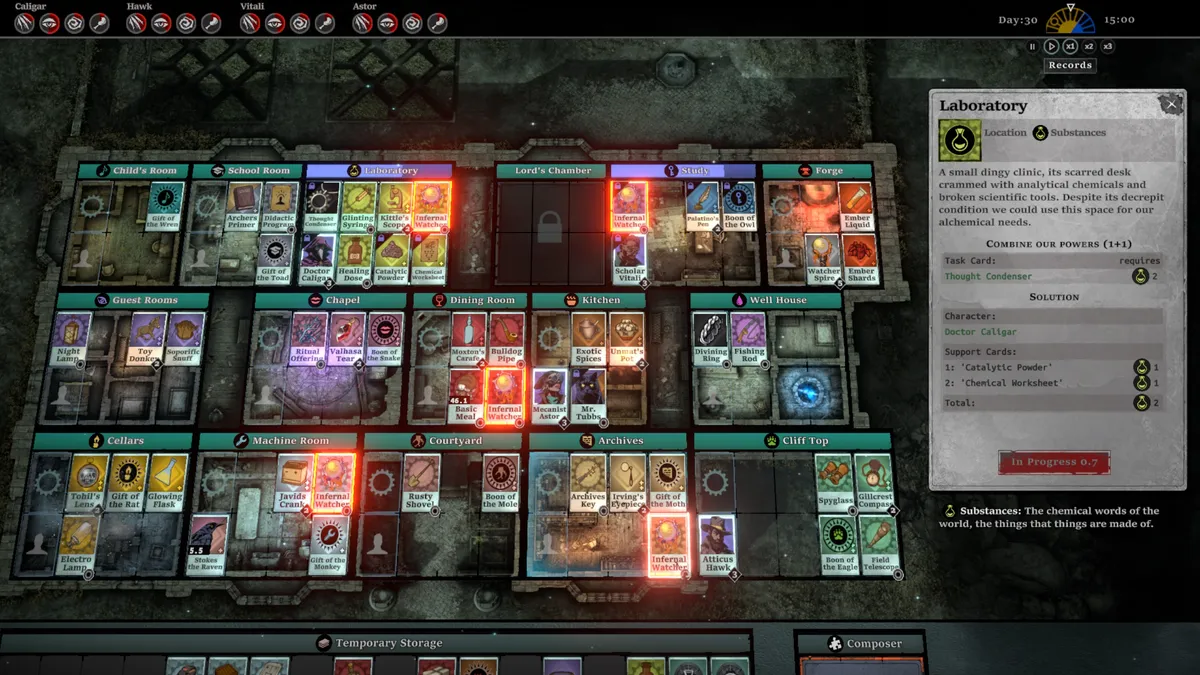Played The Horror at Highrook
This is actually only the second one of these, uh... card... combiner... games? that I've played. I've tried Stacklands and Stacklands only, I mean.
Highrook is extremely different. It's definitely more like a traditional adventure game - all the inventory-combining puzzles of yore, just without most of the conversations or locations, and with a huge amount of multitasking added. You've got four characters who are capable of combining inventory items, and a whole mess of places to put them in the various rooms of a haunted manor. There's a set of cards which work in each room, and you're combining them to generate various resources. They all run meters constantly, so if you like managing a lot of little timers (which I do!!) then there's a lot of agreeable optimization to be had.

However, I had to relearn whatever system of resources I was processing or generating every time I returned to the game. The systems you're working with are entirely novel to the setting, so they're not particularly easy to intuit or draw conclusions about on your own.
Example: using a bucket to pull fish out of a well generates several different kinds of fish. Some of these fish can be processed in the kitchen... or in the laboratory. The fish that goes into the laboratory turns into glowing juice you can use to explore the cellar. The fish that goes into the kitchen becomes... a sleeping potion? To complete a skill check for a sleeping-related task, I'd have to remember that fish from the well can become sleeping potions that boost my "Dreams" score.
It's not too frustrating, but it is definitely a game where I found myself repeating an item-generating system over and over again to make sure I'd gotten everything out of it that I possibly could... and then I came back to the game the next day and banged my head on it all over again, because I'd forgotten all its intricacies overnight.
After I caught myself doing this, I tried to be more careful about it... but sometimes an interaction which didn't previously generate a certain plot-relevant item will start generating that item after a chapter advances in the storyline. So, sometimes I did have to start banging my head against an exhausted system again in order to advance the plot. It was just never clear which item-generator systems would do this, so I'd have to test 5-8 different ones every time I got stuck.
The game is a little too long to play in a single sitting for most people, even on a free and clear weekend day, so I do think that it needs a bit of note-taking infrastructure to help the player manage all this stuff. I think if Highrook had just been a little more transparent, I would have enjoyed it completely unreservedly. For example, I'd have preferred it if cards marked themselves in some way when the resources they generate have changed. Or if each card's text listed the things they generated, once you'd discovered each one. Or if there was a codex of recipes! (At time of writing this post, you'll have to use the one and only Steam guide for that.) If I were playing this game from scratch again somehow, I'd just lean on that guide whenever I got stuck.
I'm complaining, but it was fun, and I did finish it! I do not finish games I'm not enjoying. It struck me as an interesting combination of different inspirations and goals I'd seen in other games, but not together before. It made me think a bit about alternate takes on these systems that I might like to explore myself someday, which is always nice. It describes itself as being a kind of "board game," and it definitely borrows from those aesthetics - bits of it reminded me of a friend who would play Arkham Horror solo with the help of a mobile app when we were in college. Unlike Arkham, however, it's not particularly interested in punishing you.
Which is great. As someone who likes managing four fiddly little timers at once, I'm already punishing myself enough!!